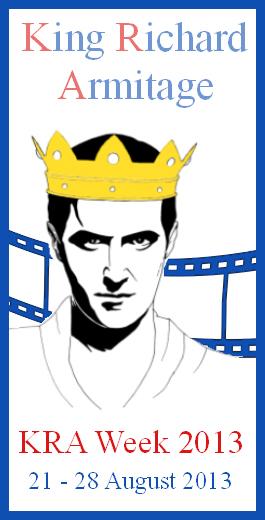Search Results for: Lewis
Why Would Richard III Do It?
Matt’s History Blog (April 10, 2014)
Why Would Richard III Do It? by Matt Lewis –
Interesting article about the potential motives and interested parties in killing the Princes in the Tower. With a poll, where you can decide whom you trust (or rather don’t trust) in this whole historical scheeming.
King Richard III & Envy
In my whole observations about the research concerning King Richard III, I always wonder, why everybody thinks to be able to judge him on some prejudice, rumour, envy or other motive and readily dismisses valid research done on a broad basis evaluating the available material.
A historian is bound to build as complete a basis for a research as possible and only after reviewing all (!) available sources, is allowed to come to a conclusion and has to argument from all possible angles the validity of the own conclusions.
So you will find me shaking my head in utter astonishment concerning the current discussion about King Richard III, which gets high press coverage in renowned newspapers and magazines.
I also find it hard to decide how best to present this new discussion to you, as in the major part it is so nonsensical, that I wonder why it gets so much and famous attention at all.
First I want to state that I am in no way connected to or bound to defend the University of Leicester and one certainly can argue if all researches done by them were necessary or interfered with the dignity of the person of King Richard III, but this current discussion certainly shows they were exceedingly necessary.
The argument now raised against the University of Leicester and their result to confirm the identity of the found skeleton as being of King Richard III, is that the skeleton could easily be of some other soldier buried there, just conveniently being of the direct female line leading to King Richard III’s mother.
How many unaccounted for relatives, having the exact female blood line of King Richard III, do you think are lying around somewhere? Or better are lying around at the exact spot King Richard III should be? And in addition have died in the Battle of Bosworth or by incident around that time near Leicester, so that they are buried in the Grey Friars’ Abbey? While just in the late court battle, one of the main arguments against a burial in Leicester is, that King Richard III’s family just had no connections to Leicester? So how can forgotten relatives turn up there? And were the ‘grey friars’, while so discriminating in burying people in the choir of their church, suddenly burying soldiers from the battlefield, carting them all the way from the Bosworth battlefield? Why then were only so few skeletons found and not hundreds and only one with battle marks? Oh, and what a strange method to bury them without clothes and with bound hands? Really, the ‘grey friars’ must have had no piety at all…
I could go on much longer, as a result of the conclusive multitude of researches done by the University of Leicester and though some think it may now be enough research done on the skeleton of King Richard III, still the results in their entirety (not necessarily one taken on its own) give us a very complete and convincing affirmation of the skeleton’s identity as being King Richard III.
Especially helpful in that regard to see the full picture of research results and why they were done, is the excessive pre-research done by Dr. John Ashdown-Hill, who with great determination researched the potential last burial place of King Richard III from all historical angles and laid down his progress of research as well as the conclusions he came to in his work “The Last Days of Richard III”, which we have recommended here repeatedly, as it is the go-to research which was essential in finding King Richard III.
You see, I think the counter-argument just is so far-fetched as envy possibly can make it. Perhaps, it is due to scholars feeling left out from the euphoria and joy over the find in Leicester and now try to jump on the media attention created by the extraordinary research results in Leicester.
I just don’t get it, why the media jumps on this envy train so readily and let itself be used in such a way.
The news stream includes the articles of this new conflict in the sidebar and in the 2014-archive (entries dated around the end of March 2014).
But it provides heated arguments and is one more battle area in the new “Wars of the Roses” or rather a new skirmish.
(I am quite certain the list of battles around King Richard III will have to be continued …)
But now to something creative and constructive about King Richard III:
♛ King Richard III ♛
Matt Lewis – New Podcast series about King Richard III (iTunes)
- The Richard III Podcast – A Perfect Coup (04.03.2014)
- The Richard III Podcast – Introduction (09.03.2014)
- The Richard III Podcast – Episode 2 – The Cat Who Got the Cream (18.03.2014)
Also available via the YouTube channel of Matt Lewis.
A Perfect Coup
Matt’s History Blog (February 10, 2014)
A Perfect Coup by Matt Lewis –
Very convincing summary of the conflicts and situation at court Richard III was forced into after the death of his brother King Edward IV and the plots and machinations of William, Lord Hastings.
Books & King Richard III
♛ King Richard & Books ♛
Christmas is coming up and as books still are one of the most favourite presents, I collect some reading tips here for you.
Not that I get through the multitude of new publications about King Richard right now – and some books still await me at Christmas – but there are new books I especially wanted to bring to your attention and recommend here, as I enjoyed reading them myself.
If you have books you would like to add to this recommendation, please feel free to either post them in the comment section of this post or send me a mail (contact form) to write and explain more about your recommendation and why you like the book(s).
Victoria Smith let us know her favourite King Richard III novel “The Murders of Richard III” by Elizabeth Peters and especially wrote a review for us.
(As usual here on KRA, earnings from embedded affiliate links on this site go to the charities recommended by actor Richard Armitage on his JustGiving page.)
♛ King Richard & Jane Shore ♛
Isolde Martyn – “Mistress to the Crown”
“Mistress to the Crown” follows the life and struggle for freedom of Jane Shore, the famous and influential mistress of King Richard III’s oldest brother, King Endward IV.
Her life never appeared to me as an especially romantic one, so a novel about Jane Shore coming out in a publishing house known for its extensive romantic novels instantly got my full interest.
From my previous comments about other works of the author Isolde Martyn, you already know that I adore her writing style.
Isolde Martyn also does not disappoint in this novel:
- Her writing is fluent and gripping that once I began reading, I could not put the book down. Though I already know the story of Jane Shore, I still needed to know how her life and fate unfolds in the story.
- The historical research which went into this novel is extensive and far beyond what I would normally expect from a historical novel. So for me, Isolde Martyn’s novels clearly are in a ‘historical novel’ class of their own.
But the astonishing part of this for me is, that the books do not appear like a historical lecture, but unobtrusively and fluently the fate of Jane Shore unfolds in a way where I begin to care for her, while I never felt very ‘understanding’ for her and her fate before. - For all King Richard interested readers, of course King Richard plays his role in the book as well, though more as a background figure, but still actively influencing the fate of Jane Shore.
At the time of the first English publication (03/2013), we published an
interview with author Isolde Martyn (14.03.2013).
Now, the book is also available in a German edition:
(The print edition was not available via Amazon.de at the time of the post, but should be shortly. If you want to order it for Christmas, here is the direct link to the publisher.)
Links to the English version:
♛ King Richard & Art ♛
Author Matthew Lewis (interview of 27th of August 2013, with book links) in his novel “Loyalty” follows Jack Leslau’s (http://www.holbeinartworks.org/) research and picture analysis and brings King Richard III in connection with the Holbein household.
♛ King Richard & Research ♛
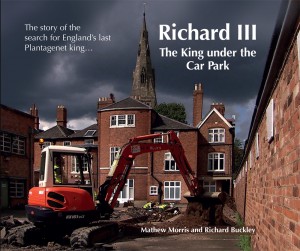
Mathew Morris & Richard Buckley: Richard III. The King under the Car Park. The story of the search for England’s last Plantagenet king…
University of Leicester: ‘Beyond reasonable doubt’: archaeologists give first-hand account of Richard III discovery in new book, by Peter Thorley (04.11.2013)
From the intense research done to find and identify King Richard III, I must admit, I had expected a big volume of a book. The publication is a rather slim one, but so much filled with detail and information, that I am not the least bit disappointed.
Though much of the information and material had been published in the press already, the explanations and collection of image material and details known about King Richard III is unique and I am very glad to have this book as a valuable reference about the last days of King Richard III as well as his discovery in Leicester.
So though the book is not a detailed description about how King Richard III was found in Leicester – go to the publication by Philippa Langley and Michael Jones for that – I really can recommend this book for the invaluable collection of research results.
Philippa Langley/Michael Jones: The King’s Grave
Dr. John Ashdown-Hill did the essential research to enable the following work by the University of Leicester to find King Richard III.
His publications show the fascinating search for details so far missing or overlooked, but which proved to be exceedingly necessary to the final search:
More details about Dr. John Ashdown-Hill.
Just recently published:
Dr. John Ashdown-Hill also works on a new publication about King Richard III’s brother, George Plantagenet, the Duke of Clarence – you know the always irritating one where legend has it that he ended in a butt of Malmsey wine.
Announced for March 2014:
Happy Birthday, King Richard !!!
Happy 561st birthday, King Richard III !
King Richard III’s first birthday after being found !
Let’s celebrate a king, who, after over 500 years can activate a fierce followership and easily start a – no, what am I talking about – numerous burning controversies.
Who else from history can say that about himself after all that time.
Stand strong and true for that which you believe in. Do not be silenced.
Now, how best to celebrate a king?
Or would you like to celebrate with an audio play?
Upcoming broadcasts begin on Monday, 7 Oct 2013 on BBC Radio 4. (See BBC page for the play and schedule here.)
King Richard III must feel right at home in modern times and we have a strange way of making him feel welcome.
But he certainly must see the parallels to his time. Skirmishes everywhere and all ready to do battle.
What a perfect continuation of the Wars of the Roses in its modern form.
I even feel compelled to say that he might be glad, that his duty as king is over and he now can continue as a spectator.
But the whole movements are perfect to finally give King Richard III the attention he deserves and even if you don’t agree with the one or other argument, at least they are a perfect marketing way to draw interest to his wishes, which nobody considered (during his life and especially) at and after his death 500 years ago.
Want to know more about King Richard III?
If you want to learn more about King Richard III and his time and life, the University of Leicester will hold a free online course (distance learning) on the platform FutureLearn.
See the announcement for it on Medievalists.net.
The course will be held by Senior Lecturer in Archaeology and Ancient History, Deirdre O’Sullivan from the University of Leicester
and will start on 25th of November 2013.
Duration: 6 weeks
Approx. time: 2 hours per week
No previous experiences necessary, so, if interested, join the online course here.
♛ King Richard III ♛
- HistoryExtra.com: Richard III tomb design unveiled by Leicester Cathedral, by Emma McFarnon (20.09.2013)
- TheTablet.co.uk: Finally, the judical review raises hopes of a Catholic burial for Richard III, by Angela Searles, guest contributor (20.09.2013) – With an ePetition for a Catholic church service for King Richard III.
- Daily Mail: The caricatured King and I: Why PHILIPPA LANGLEY, the author who located the remains of Richard III, wants to restore his reputation, by Marylin Swan (21.09.2013) – Interesting background article about Philippa Langley and her relentless search for King Richard III.
- Las Vegas Review Journal: Admirer of Richard III joins argument over burial site, by Jane Ann Morrison (22.09.2013) – Joe Ann Ricca, a very knowledgeable supporter of King Richard III and contributor to the KRA-website.
- LivingWithKingRichard (Blog): Changing Tombs, by Serpentine Black (22.09.2013) – I don’t really agree with that argument against the Richard III Society’s design, but I am certain the historian in me speaks here. As their design tried to get a contemporary sign language onto the tomb for King Richard III, which would be recognizable and honorable for the king himself, while already reducing it to a minimum to please a modern generation used to scarce and minimal designs. This bridging of the time and pleasing two sets of expectations, was really done well and thoughtfully, so I am not astonished about the great support the design by the Richard III Society got. But read the wider argument and see illustrations accompanying it here in this post by new blogger Serpentine Black.
- HistoryExtra.com: Richard III Society members withhold donations for king’s tomb in design row, by Emma McFarnon (23.09.2013)
- The York Press: Richard III tomb ‘looks like it was designed by Ikea’ (23.09.2013) – From the argument of Vanessa Roe – Richard’s 16th great-niece and part of the Plantagenet Alliance – it seems the design is more for our times and especially an Ikea clientele than for a king of 500 years back.
- ThisIsLeicestershire.co.uk: Leicester City urges fans to back Richard III campaign, by Peter Warzynski (23.09.2013)
- ThisIsGloucestershire.co.uk: ‘Raiding party’ may bring Richard III home to Gloucester, by The Citizen (23.09.2013)
- BBC News: Funds withdrawn in Richard III Leicester tomb row (23.09.2013)
- The Independent: Richard III tomb donors withdraw money over design, by Nick Clark (23.09.2013)
- Daily Mail: Funds for Richard III’s tomb are pulled because the proposed modern design ‘doesn’t befit a warrior king’, Sarah Griffiths (23.09.2013)
- BBC News: Richard III parliamentary petition misses target (24.09.2013) – There will be no Parliamentary Debate about King Richard III, as the petition has failed to gaine the required 100.000 signatures. But over 36.000 signatures is a success in itself.
There are some further petitions going on, though I lately have the impression that they appear much too liberally. Regarding some, I have sent messages to the initiators to confirm the intent and issuers of King Richard III related petitions, but did not get feedback, so I won’t mention those here. - The Telegraph: A sordid song and dance over Richard III’s bones. The furious arguments about where and how to bury old Crook Back are ultimately pointless. By Christopher Howse (24.09.2013) – Very knowledgeable and informative article about kings burial locations and the dispute about King Richard III.
- Leicester Mercury: Richard III: Bosworth flag set to sell for thousands, by David W. Owen (24.09.2013) – Original relic of a defeat or a victory over time?
- Leicester Mercury: Richard III: Hundreds have their say on tomb designs (25.09.2013) – Feedback to the new tomb design revealed by Leicester Cathedral. (Feedback to tomb was: 78% No / 22% Yes)
- AccessHollywood.com: The White Queen Q&A: Aneurin Barnard Talks Taking On Richard III (28.09.2013)
- Leicester Mercury: Leicester’s Chinese twin city backing Richard III campaign, by Peter Warzynski (28.09.2013) – King Richard III does not only cause controversy, but also strong international support.
- BBC News: ‘Battle of Bosworth relic’ sells at Derbyshire auction (28.09.2013)
- ThisIsLeicestershire.co.uk: Runners backing campaign to keep Richard III in Leicester, by David Owen (30.09.2013) – Wide enthusiasm for the petition for Leicester. A few more days to sign, while the York petition already closed.
- ThisIsLeicestershire.co.uk: Kasabian: Richard III’s a Leicester boy and should be buried here, by Leicester Mercury (01.10.2013) – For whom is the publicity? For Leicester, for Kasabian or – eventually – really for King Richard III?
- ITV.com: Flag to fly for Richard III (02.10.2013) – On his birthday, King Richard III’s standard is raised over Middleham Castle in his honor.
- Twitter.com: Aneourin Barnard Birthday tweet for King Richard III (02.10.2013)
Huge Happy Birthday to Richard The Third!!! pic.twitter.com/k6iIBt63j9
— aneurin barnard (@aneurinBarnard) October 2, 2013
- Leicester Mercury: Richard III: 30,000 people sign petition to keep king in Leicester, by Peter Warzynski (02.10.2013)
- Leicester Mercury: Bury the king in the city, says Leicester City’s King (02.10.2013) – Now what have foxes, football and a Mr. King to do with King Richard III? Find out in Leicester…
Due to strange internet connectivity problems, this post unfortunately is very late. Still I hope, King Richard III has/had great 561st birthday celebrations.
My internet connection gets a complete technical check by the provider next Monday and hopefully the source of all the problems will finally be found and eliminated.
Celebrating 2.000 Signatures
2000 Signatures
for the Film-Petition
King Richard Armitage
Your support made this possible!
Not everything in life is about numbers, but everything is about quality.
And so I especially want to thank you for the high quality of discussions, feedback and your ongoing and encouraging support !
Thank You !
It would not be me, if I would not take this opportunity to give the about 200 signers who did not confirm their signature via the confirmation e-mail a further chance to do so.
So please watch out for confirmation mails, if you did not confirm already.
♛
You will have recognized the little break in posts and news-updates.
Work intervened and prevented faster updates and better feedback to your request.
If you are waiting for mails or feedback, please keep patient and give me a bit more time to answer.
Right now, I am working hard to get through to see the surface of my desk again. As there is a picture of Richard Armitage there, it is really a pity to be completely covered up with work.
♛
But now to the in the meantime accumulated news.
The “War of the Cities” continues in full force:
♛ King Richard III ♛
- CNN: Richard III’s last battle: New ‘War of the Roses’ over royal remains? By Bryony Jones, CNN (05.09.2013)
- ThisIsLeicestershire.co.uk: Council ‘invests in Richard III’s legacy’, by Peter Warzynski, Leicester Mercury (06.09.2013)
- ThisIsLeicestershire.co.uk: Richard III Society remains neutral on final resting place, by Dr Phil Stone, Chairman, Richard III Society, in Leicester Mercury (09.09.2013)
- ThisIsLeicestershire.co.uk: Richard III: Row stirs Plantagenet passions, by Peter Warzynski (09.09.2013)
- ThisIsLeicestershire.co.uk: Richard III: ‘Leicester must fight tooth and nail to keep the king”, by Peter Warzynski, Leicester Mercury (09.09.2013)
- ThisIsStaffordshire.co.uk: Tristram Hunt: Why Leicester should keep hold of King’s remains, (09.09.2013)
- The Times: Rebel found with the badge of Richard III, by Jack Malvern (10.09.2013)
- The Independent: Was the downfall of Richard III caused by a strawberry? By John Rentoul (11.09.2013)
- Travelbite.co.uk: Leicester Travelodge marks role in Richard lll story (11.09.2013)
- Leicester Mercury: Richard III: More than 20,000 sign king bid (12.09.2013)
- Telegraph & Argus: ‘King Richard III belongs in Yorkshire’, says Keighley Author (12.09.2013) – Author Carol Fellingham Webb supports the petition for a Yorkshire burial.
- BBC News: The Plantagenet Alliance: Who do they think they are? By Greig Watson (13.09.2013) – Detailed and informative article about the Plantagenet Alliance, their goals and opponents.
- ThisIsLeicestershire.co.uk: MoJ to challenge Richard III review, by Peter Warzynski (14.09.2013) – The ‘War of the Roses’ continues in its modern, legal form in full force. The Ministry of Justice intends to defend the decision for Leicester.
- Royal Central (Blog): The Defence of King Richard III Part 5 – Brotherly Love, by Matt Lewis (15.09.2013) – A series of articles skillfully defending King Richard III and his actions from a well researched historical perspective.
The whole series is a real reading tip!
Also see our interview with author Matt Lewis during our King Richard Week 2013. - Royal Central (Blog): Dame Judi Dench supports a York burial for Richard III, by Cindy Stockman (16.09.2013)
- ThisIsLeicestershire.co.uk: Richard III: Site of king’s last night given special plaque, by Peter Warzynski (16.09.2013) – The Blue Boar Inn, where King Richard III spent his last night before departing to the battle field and where he left his bed (indicating his need for special sleeping accommodation regarding his spine ailment).
- ThisIsLeicestershire.co.uk: Richard III: ‘Wobbly’ bones should stay in Leicester, by Peter Warzynski, Leicester Mercury (17.09.2013) – Pupils for King Richard III.
- The Telegraph: Chris Grayling to ‘vigorously defend’ Leicester burial for Richard III, Nic Collins (18.09.2013) – I wonder how King Richard III’s life could have looked like, if he would have had lawyers too fight his battle.
- ThisIsLeicestershire.co.uk: Richard III: Roy goes round and round for Richard III, by Peter Warzynski, Leicester Mercury (18.09.2013) – The man behind the petition for Leicester, Roy Shakespeare, collects signatures.
- ThisIsLeicestershire.co.uk: Richard III: Eyes of world could focus on king’s reburial, by Peter Warzynski, Leicester Mercury (19.09.2013)
- Daily Mail: Richard III will receive a burial fit for a king under a raised tomb made of Yorkshire limestone positioned on a large white rose, by Sarah Griffiths (19.09.2013)
- Yorkshire Post: University ‘hijacked’ Richard III bones discovery, by Paul Jeeves (19.09.2013) – Article about the interview with Philippa Langley’s supporters Dr David and Wendy Johnson from York.
- BBC News: Richard III tomb new design revealed by Leicester cathedral (19.09.2013) – With video news report.
- Leicester Mercury: Final Richard III tomb designs revealed, by Peter Warzynski (19.09.2013)
Off Topic:
- Haaretz: This day in Jewish history / Richard I is crowned and London’s Jews are massacred, by Ruth Schuster (05.09.2013) – King Richard III protected the Jews in his country. Does he get praise for it? No. He still remains the most dubious king on England’s throne, potentially deserving his bad reputation as much as others do their good reputation or eventually not…
KRA-Week 2013: Thank You
! Congratulations !
to our KingRichardArmitage Champions
We have the winners of this year’s quiz!
The quiz remains open so that you can further try your knowledge,
but the book prizes will go to:
Fabi & Kathryn Barnes
To my great surprise, it was a point decision and not by random number selected from all the correct answers.
And I had thought, I had made the quiz much too easy.
Sorry! Solutions are available here now.
Quiz prizes are: Two books by
Isolde Martyn “The Devil in Ermine”
♛
Thank You !!!
to all interview partners
- Authors Isolde Martyn & Matthew Lewis – for their wonderful novels about King Richard III,
- Peter Warzynski – for his insights into archaeology and sharing first-hand Leicester experience with us,
- Fitzg – for her insights into King Richard III’s clothes,
- Jim Cowan – for exploring King Richard’s Wales,
- Dr. Ashdown-Hill – for enabling the find of King Richard III, and
- MaryAnn & Michael Tedstone – for bringing King Richard III back to life in music,
and all our helpers and contributors
of the King Richard Armitage Week 2013.
It was a fantastic experience for me
and I hope you enjoyed the celebrations!
KRA-Week 2013-4: Peter Warzynski & Leicester
Links: King Richard Week 2013 & Quiz
♕ ♛ ♕
Interview with journalist Peter Warzynski
about
Leicester & Archaeology & King Richard III
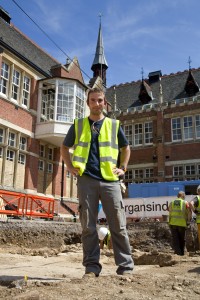
Peter Warzynski, Leicester Mercury – at the digging site where King Richard III was found. 7/2013 (Source: Peter Warzynski)
After yesterday’s interview with author Matthew Lewis, today we have an interview with journalist
Peter Warzynski from Leicester.
For all who follow the news about King Richard III here, he will not be a stranger.
Peter Warzynski is the knowledgeable reporter with the reliable news and information about Leicester and everything King Richard III. If the general news reports are vague about a topic, go find his article on the matter and you will certainly find the background and information you are searching for.
So I was very curious when Peter Warzynski wrote about his first hand experiences during the second digging at the location of the Greyfriars’ Church in Leicester in July 2013, and – surely not a daily occurrence for a journalist – I asked him for an interview, which he kindly granted.
The article in the Leicester Mercury with a fantastic picture of the digging area and his exact spot of research:
Leicester Mercury: Richard III dig: The hidden secrets of historic friary (20.07.2013)
And the description of his experiences during the archaeological research:
Leicester Mercury: Richard III dig: My brush with urban archaeology (22.07.2013)
With Peter Warzynski, I hardly could stop myself asking him questions. He is so knowledgeable about Leicester, has first hand experience about the digging, the location and the town.
Now, I hope you will enjoy the interview as much as I did while getting all my curious questions answered:
♛
Can you tell us a bit about yourself, your background as a journalist and your connection to Leicester?
I was born in Leicester, in the city, just a few miles from the car park where they found the remains of Richard III.
I’ve been a journalist for about eight years, starting at BBC Radio Leicester and moving to the Leicester Mercury about five years ago. I now live in Wigston, about five-miles outside of the city centre.
What is your impression about how the people of Leicester feel about the discovery and King Richard III himself?
I haven’t heard anything negative about the discovery from people in Leicester. Everyone is over-the-moon that we have a king buried in our city… and they’re even more excited about the fact that he will be reinterred at the Cathedral next year. Hopefully. The legal battle for the remains could push things back, but if the High Court sees sense it will make its decision quickly and the reburial can go ahead as planned.
The influence of Richard III in Leicester and Leicestershire is huge. We have the annual Battle of Bosworth re-enactment, we have roads, towns, schools and places named after him. We have statues, monuments and plaques dedicated to him. And we are in the process of building a museum in his honour.
How is the influx of visitors generally seen for / in the town?
Tourism is not our greatest industry, but we do fairly well.
Saying that, since the discovery of Richard III, it has boomed – and you can see that people are jumping on the bandwagon and using the king to promote their shops.
Advertising for local businesses suddenly has a Richard III theme and tour operators are offering packages to holiday makers which include all of the Richard III related sites.
More than 100,000 people have visited a small, temporary exhibition at the Leicester Guildhall, in the last few months. They have travelled from America, Australia, Asia in their droves and queued for hours to see the humble exhibition.
Next year a £4m permanent visitor centre will open, which will feature the grave of Richard III and is expected to attract millions of tourists.
It remains to be seen how long the initial explosion of excitement will last, but judging on how well people have taken to it, I think it’ll be a sound investment.
It had always been clear that King Richard III had been buried in Leicester after the Battle of Bosworth, but what does the knowledge that he indeed is there and finally found change for Leicester?
I don’t think it has always been clear. There was evidence to suggest he was buried by the Grey Friars, but where exactly that was has been a mystery for years.
Granted there was evidence to show that he was at the friary, but then again there was conflicting accounts to say he was elsewhere.
One of the main changes, now we know we have his bones, is the way Richard’s story is taught in school. Until the bones were identified, people still argued that his remains were dug up at some point in the past and thrown into the River Soar. That myth has now been quashed.
There is still quite a bitter debate over who identified the real location of the grave since the Greyfriars dig.
John Ashdown-Hill, who tracked down Michael Ibsen – Richard III’s 16th great grandnephew – claims he pinpointed the grave first.
However, the University of Leicester says that one their own – a lovely chap named David Baldwin – was the first person to positively identify the final resting place of the Plantagenet monarch.
Were you interested in King Richard III and his story before the digging in Leicester began?
Everyone in Leicester knows about the story of Richard III because he has had such a big influence on the city and the county.
As I mentioned before, the Battle of Bosworth is re-enacted every year. (In fact, this year, a German (Bavarian) man by the name of Andreas Wenzel will play the role of Richard at the anniversary re-enactment.)
So all Leicestershire folk have an interest in the former King – everyone I know has read Shakespeare’s imagining of him at school at some point.
I have an interest in history anyway, so this is very much up my alley (so to speak), and I the fact that history is playing itself out on my doorstep is fantastic. I also hope it will inspire others to become interested in history too.
King Richard III, though dead for over 500 years by now, still awakens great emotions, varying from hatred to support and loyalty. What do you think might be the reason for this heated debate about him, when other royals or historical figures can expect a more ‘neutral’ research into their life after such a long time?
Richard has polarised people for hundreds of years because nobody really knows what he was like. Or at least nobody knows the complete truth. There have been so many conflicting accounts written about him, it is impossible to determine what the man was truly like.
Did he murder the Princes in the Tower? Did he die bravely in the thickest press of his enemies? There’s nothing to sat he did both – or neither. This is the problem with trying to establish his character.
I believe that Richard ruled and acted like a typical medieval monarch. As far as people of the time were concerned, he was a conventional king.
I think that because very little is known about him, and due to a war of slander and deformation with Henry VII, what people think they know is shrouded in uncertainty – and it is very easy people to pick and choose what they believe and discount the pieces of history that don’t fit with their image of him.
The problem with my point-of-view of Richard is that by sitting on the fence I manage to alienate both the supporters and detractors with my boring uncommitted open-mindedness.
What did King Richard III and discovering his remains in Leicester change in your life?
Has your attitude / awareness for Richard III in your town (city) changed since the beginning of the digging? Was the digging you could join able to change your perception / perspective?
The discovery has changed the way I view archaeology.
I worked with the University of Leicester dig team on the second Greyfriars excavation, which finished a few weeks ago. It was at the same site and the grave of Richard was still visible – but this time the team was looking for more information about the friary itself.
The experience was like a roller coaster – one minute I was laboriously brushing the dust from the 50th broken tile I had found, daydreaming about what I was going to have for dinner that night. The next I was lifting the lid from a 600-year-old stone coffin to reveal what everybody thought would be a medieval knight, or the founder of the friary. I say ‘thought’, because what we actually found was a second lead coffin inside the stone tomb – a surprise for everybody, even experienced site director, Mat Morris – who found Richard a year ago.
After taking part in the dig, I realised just how unbelievably unfathomable it had been that the team had stumbled upon Richard’s grave the way they did.
When I spoke to Richard Buckley – who led the project – on the first day of the original Greyfriars dig in August 2012, he said he would eat his hat if they found anything. He was convinced the best the team would do is find part of the medieval friary – maybe the church.
So it goes to show how unexpected the find was.
Were you interested in archaeology before King Richard III was searched and found? If yes, why and how did you get information, what interested you?
What interests you now, after you have experienced a digging yourself?
I was interested in archaeology the same way most people are interested. I like books and documentaries about Egyptian tombs and Mayan ruins – not city centre digs.
Now, however, I think there’s something to be said for urban archaeology.
Since the discovery of Richard III, I have written a few more stories for the newspaper about other digs in Leicester – not connected with the Greyfriars – and I’ve learned a lot about the history of the city – who founded it, how the first settlers lived, when the Romans moved in, when the Romans moved out and how Leicester grew.
Digging so close where King Richard III was found, what aspect was more important to you. To get more knowledge about archaeology in general, about the history of your town or possibly about a famous king, who had gone missing some hundred years past?
I think all three tie in together. The more I found out about archaeology through working with the team, interviewing the archaeologists and reading about the project, the more I understood how amazing the story of Richard III was.
The University of Leicester maths department calculated that the odds of finding the remains was less than one per cent.
When you learn that only 17 per cent of the friary is not buried beneath buildings, walls or roads – that in itself is amazing.
If Richard had been interred anywhere else in the remain 83 per cent of the friary – which is unreachable – he would never have been found.
How important was the factor of good weather for your digging? What influence did it have on your results and speed of your digging?
It didn’t really have that much of an impact. The sun dried out the earth which made it difficult to photograph and catalogue because of the dust – it settled everywhere and made the whole place one uniform colour. It meant that details on stonework and tiles were indistinguishable from other nondescript areas. So before every photo was taken the whole site had to be hosed down and watered to bring out the detail and colour of the archaeology.
What methods did you see and were allowed to do yourself during the dig?
The dig process was mostly a meticulous one. First the heavy machines come in and remove the Tarmac and top soil. Then the archaeologists take over once they feel they’re close to the archaeology. My role involved using mattock – a type of pick – to carefully remove layers of soil and then once I’d come across something of interest – which mainly turned out to be medieval floor tiles – I would use a trowel and brush.
However, like I mentioned before I was also there when the stone coffin of Sir William de Moton (although it could be a number of other likely candidates) was unearthed, which was very exciting.
When we removed the stone lid, everyone expected to see a skeleton. But what we found was a second lead coffin inside, which is now at the university undergoing analysis.
In what aspects was archaeology more difficult and harder or easier than you expected?
Did the archaeological research and the used methods meet your expectations?
There’s a lot of manual labour involved. Shifting large wheelbarrows full of soil and debris from the excavation site.
One minute you’re heaving big clumps of dirt from the earth, and the next your being very careful because you’ve found ‘something’ which might be very interesting – and you have to change tact and be very gentle.
Anyone can do the bits I did. The hard part comes when you have to identify what it is you’re digging – and knowing when to stop smashing the ground with the mattock and use you trowel instead. Luckily, I was working with an experienced archaeologist the whole time – and I was probably asking very stupid questions.
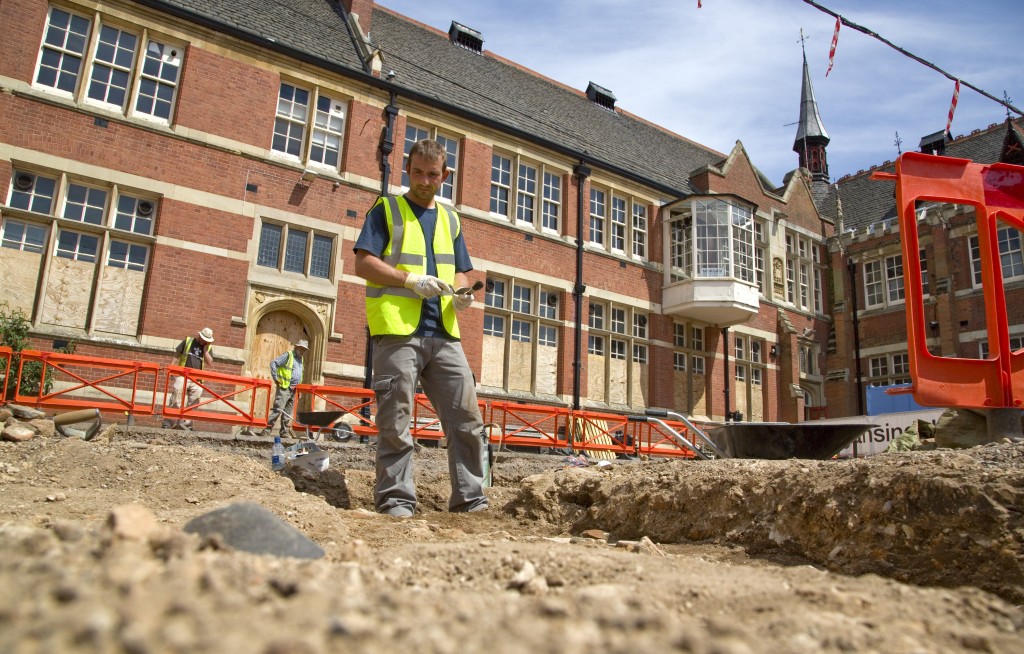
Peter Warzynski, Leicester Mercury – at the digging site where King Richard III was found. 7/2013 (Source: Peter Warzynski)
Your trench 4 looks rather level and not very deep, compared to some other trenches. Was this because of the richness of tiles already preserved in this upper soil section or did you later go deeper as well in a presumption that the area might have been filled in with debris from the destroyed monastery?
That was the top of the trench. Once the tiles had been catalogued and photographed we smashed right through them and continued deeper down. I was a bit taken aback by this. I thought we should be preserving them and removing them from the ground for storage.
However, it was explained to me that if the archaeologists did that with everything they found, especially the hundreds of broken tiles, they would soon run out of room to store them. They told me that the only way of finding out what was buried below their feet was to dig down, record what they had found and keep going. Much of the archaeology they came across was unceremoniously hacked through once it had been recorded.
This is the way it has always been, ever since the first archaeologist picked up a mattock.
Your trench looks very close to the grave of King Richard III. Can you tell us more about the placement of this section in the presumed church layout?
What area did you reveal in comparison to the location of where the grave of King Richard III was situated? Had you hoped to find something with significance to King Richard III in the church?
The site that was being excavated was the choir of the church. A place where only the friars could go.
It was reserved for high status burials and the team actually uncovered – but did not exhume – a number of other remains during both digs.
It faces east to west, as is the tradition with churches, and included a presbytery – where the stone coffin was unearthed. To the north was the friary’s graveyard, which extends under the neighbouring building and the road which separates the site from the Cathedral (where Richard will be reinterred next year).
The second dig was not aimed at finding anything else directly related to Richard III. Historical records say that Henry paid for an alabaster tomb for Richard, but that was never found. It would have been interesting that had been uncovered.
The second dig was aimed at finding out more about the friary itself.
Might King Richard III have been able to make archaeology more popular?
Will superficial observers now, after King Richard III was found so quickly, think archaeology is a fast method? What impression did you get?
The way Richard III was found is certainly not common in archaeology. Archaeologists do not look for specific people – that is very rare. What archaeologists do is dig and see what they find. To go out with the specific intention of finding a particular person is almost unheard of, which is what makes this story even more fascinating.
So, with that in mind, this project might give people the wrong impression about archaeology.
The discovery has also kick started media speculation about other English kings and their presumed whereabouts, and there have been stories in the newspapers about searching for Alfred the Great.
I suppose people might think that archaeology is fast and easy after following Richard’s story. After all the team found him on the morning of the first day of the dig, in the first place they looked, in the first trench that they dug.
Will you attend the burial ceremony of King Richard III next year? What are you looking forward to most? What aspect of the ceremony do you think especially reflects on the person of King Richard III? What aspects do you think – as far as they are known so far – are more to appease contemporary sensibilities rather than King Richard III?
I will definitely be at the reinterment ceremony next year to report on the event, speaking to visitors from far-flung lands and enjoying the occasion for myself. I can’t wait. I’m also working with the cathedral on the plans at the minute, and I’ve been sworn to secrecy regarding the details of the service. Although, they haven’t really told me that much – I think they are still quite distrustful of the press.
The cathedral is not used to this kind of media attention (unlike the university and the city council) and I think it feels slightly uncomfortable.
Despite the judicial review into the exhumation licence, I still think Leicester will be the location of the reinterment. So I’m not worried about York snatching the bones from under our nose.
They could be famous last words, but common sense, and the law is on Leicester’s side. The spurious claims of the Plantagenet Alliance – that they are in some way related to the king – will be shot down within seconds. Richard III has millions of relatives in the UK, with an equal right to the remains.
The fact is, after 500-years, almost everyone in England who can trace their family tree back to the 15th century will find some link to Richard.
This is why the High Court judge, Mr Justice Haddon-Cave, has agreed to hear the case, because he says the country should decide. But then by allowing the debate he’s giving priority to what will only amount to an argument, rather than to the law – which the University of Leicester followed to the letter when they applied for the exhumation licence.
Whom would you invite to attend the burial ceremony, if invitations were left in your hands?
I do think there should be a member of the Royal Family there.
What is your impression of King Richard III now, after all your experiences and your intense occupation with the research? What is your impression now, in comparison with what it was before the search in Leicester even begun?
There has been a lot written about how he has been misrepresented throughout history. I think the argument that he wasn’t as bad as people say does have its merits, but I still think he would have behaved like a monarch of the time – and that means he may not have been a complete angel either.
But whatever kind of king he was, he was buried in Leicester… and Leicester is where he should stay.
♛
Now I am certain you see, why I had such a hard time to stop myself from asking questions from my interview partners.
I hope you enjoyed both interviews with Peter Warzynski and yesterday’s with author Matthew Lewis.
More articles and interviews will follow in the next days.
Don’t forget to take part in the Quiz till the 27th at midnight to have a chance to win!
(Though it starts with questions about actor Richard Armitage, most questions are about King Richard III !
So it is not only for RA-experts, but for history buffs as well!)
Links: King Richard Week 2013 & Quiz
4 More Days …
… till our celebrations and commemoration week begins …
King Richard Armitage Week 2013
is coming up fast!
21st – 28th of August, 2013
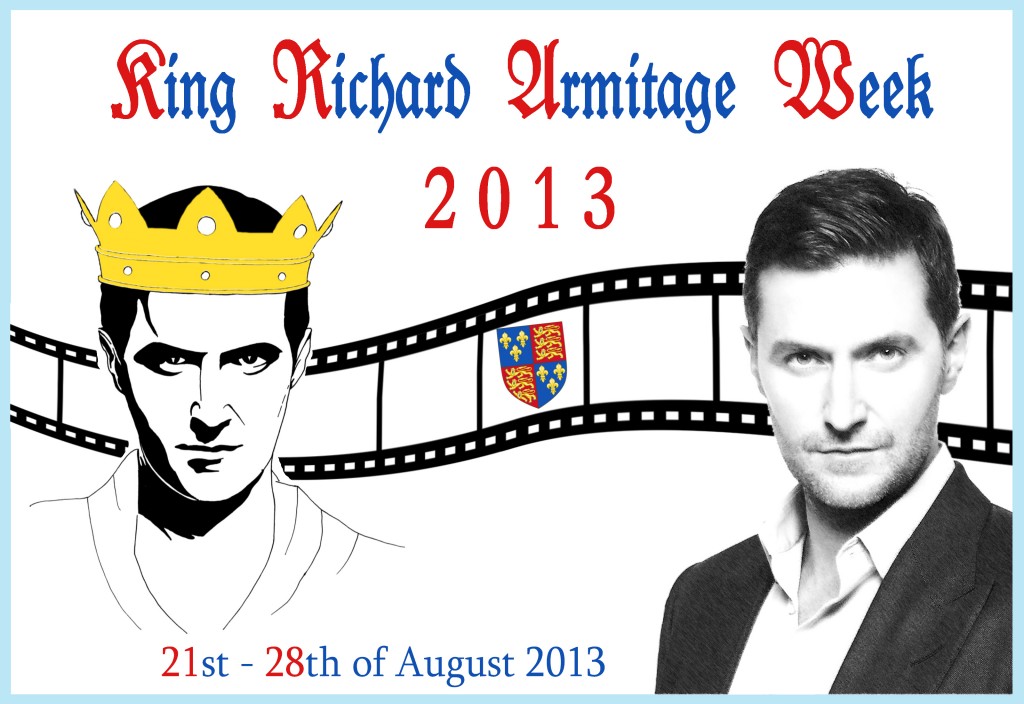
The page for the event is already created and available, though content there will be added from 21st of August, 2013, the beginning of the event, onwards.
Safe the date, take part in the upcoming quiz during the event week and enjoy fan-tastic history with us.
A few days more to live …
Not only happy memories are connected with the 22nd of August, though surely a certain Birthday lets the fandom of Richard Armitage celebrate this day. (You can leave your Birthday Wishes at specially destined places in the fandom. Thankfully Servetus created a special list of the options, to help you find the place of your choice.)
What makes this time in August especially significant to me is the fact that King Richard III’s remains were found on the estimated day his remains were buried by the Franciscan friars in their church in Leicester. So maybe the king has a certain sense for anniversaries and their special significance.
In this sense, let’s celebrate and commemorate his life, the life of a wonderful actor and the sensational find, bringing all strings magically together – in Leicester.
Commemoration and Re-Enactment of the Battle of Bosworth
begins already before the actual event
on Saturday, 17th of August 2013 !
For more information, please visit the Bosworth Battlefield website about this year’s:
Anniversary Re-Enactment of the Battle of Bosworth (17./18.08.2013)
♛ King Richard III ♛
- Liverpool Daily Post: I can’t accept Richard III sounds like a pantomime country bumpkin with a terrible nose cold, by Laura Davis (08.08.2013) – I am not alone with my reservations. Though my doubts are more along the lines of the well nourished head replica, while King Richard III in sources is mentioned as rather slim and ascetic looking, which the portraits – unfortunately no exact one survived from his lifetime – would confirm.
- The Framework Blog: August Is Hot: Proud Moment, by Violet (12.08.2013) – Violet discovered
sensational news
about the film project and the developed script by Philippa Langley. The name “Blood Royal” for the script is revealed on her publisher’s website: Macmillan, where her next book “The King’s Grave” is due to be published in October 2013. Read more about Violet’s discoveries here!
“Blood Royal” reminds me quite a lot about the genealogy of the Plantagenet.
Here e.g. The Clarence Volume: “The Plantagenet Roll of Blood Royal […]” by the Marquis of Ruvigny and Raineval.
The Preface might especially be interesting for someone researching European Royalty. - Royal Central: The Defence of Richard III Part 3 – To Kill A King, by Matt Lewis (12.08.2013) – See also the previous parts in this series of defence by Matt Lewis: part 1 and part 2
- Science 2.0 (Blog): Battle Of Bosworth – The Last Stand Of Richard III Located (14.08.2013) – Interesting article, though the result and statement “Richard III. Popular among no one in England” may be arguable – as it certainly does not pay off for a king to champion those who cannot write and bring their voices to paper for later generations to hear, against someone who willingly manipulates the story told by paying for his own version and destroying the rest.
- White Rose: Sincere and Simple Thoughts (Blog): King Richard Armitage Week 2013 Coming Soon, by Fabolaktuko (14.08.2013) – Please note the name of the blog. Fabolaktuko will join next week’s KRA-event !
- ThisIsNottingham.co.uk: Scientists work to reveal secrets of King Richard III, by Bryan Henesey (14.08.2013) – Scientists are trying to find out more about the life King Richard III lead, what he ate, what illnesses he had, where he lived and traveled, …
Results of the research by Prof. Jane Evans and Dr. Angela Lamb are expected for the end of 2013! - FirstThings.com (Blog): Perry Dane on Richard III (14.08.2013) – Comment to the original article we mentioned in last week’s news updates about the rite for King Richard III‘s burial ceremony by Mark Movsesian.
♛ Richard III – Events ♛
- 17./18.08.2013
Anniversary Re-Enactment of the Battle of Bosworth
(Bosworth Battlefield Centre) - 23.08.2013, 2:30 – 4:30 p.m.
York in the Reign of Richard III, by Chris Tuckley (at the Yorvik Viking Centre)
More details here on the VisitYork website.
Closer to the Day …
♛ King Richard III ♛
- PR.com (PressRelease): Richard III: Martyr or Monster? The Shocking Truth Behind Shakespeare’s Bloody Tyrant, by Kultur International Films Ltd (01.08.2013) – This film production by does not seem to be connected with the video-DVD of the TV documentary in two parts “Richard III: The King in the Car Park” and “Unseen Story”, though I can’t find the title on the Amazon.co.uk website yet.
As announced on this Kultur-website, the DVD will become available on 27 August 2013. A short trailer is already available on this site as well.
- Royal Central (Blog): The Real White Queen? A Defence Of King Richard III, by Matt Lewis (02.08.2013) – A very enlightening background comment about the TV series “The White Queen”.
An interview with the author of this post can be found here: Interivew with Matthew Lewis – author of the book “Loyalty”, by Karen Kilrow (13.07.2013) - InLoughborough.com: Bosworth buzzing about first re-enactment since Richard III discovery (02.08.2013) – This year’s Bosworth Battlefield Re-Enactment Event is taking place on the weekend 17th/18th of August, 2013.
- University of Leicester: Emotional end of final dig at Richard III site (05.08.2013)
- Royal Central (Blog): Anne Neville – The Bad Queen? By Sean Okeeffe (05.08.2013) – Was Anne Neville, the queen about which history has nearly no reliable resources at all, really the bad queen as whom she was depicted in the latest episode of “The White Queen”?
- Royal Central (Blog): The Defence of Richard III Part 2 – The Foundations of Evil, by Matt Lewis (06.08.2013) – Was King Richard III guilty of all the crimes he was accused of? Follow this gripping series of articles by author Matt Lewis, exploring the background and coming to a verdict at the end of each article.
- IsleOfMan.com: Richard III, the king in the car park, is coming to the island (05.08.2013) – That now would be a resting place for the king. Sorry ! Don’t want to heat up the discussion again, but the headline lead my thoughts astray. The king unfortunately is not coming himself, but Richard Buckley from the University of Leicester, as the further article on the Isle of Man website ‘King in the Car Park’ Archaeologist to visit the Island, by Charnwood Tails (05.08.2013) reveals.
- Leicester Mercury: Richard III: Historian claims he was ‘airbrushed out of king story’, by Peter Warzynski, Leicester Mercury (06.08.2013) –
Quote of a ‘Spokesman’ for the University of Leicester:We had to go through Richard’s lineage again, and verify the work which was carried out more than 10 years ago. We can’t have everyone at the press conference. Perhaps we should have invited the creator of DNA fingerprinting as well, seeing as he played a part?
This in my opinion for once is a situation, where a ‘spokesman’ should not have spoken, but rather should have taken the time to research the background of the topic he was talking about. Dr. Ashdown-Hill over years researched the connections and relationships and later irrelevant sidelines, to find the valid one leading into our time, which could possibly be used for a DNA analysis. The University of Leicester – don’t think I am making accusations here as their work is a valid and necessary one as well – just had to confirm an already extensively researched line of ancestry and could rely on the previously done work, which in total was a matter of mere months.
As this is only one aspect of many, where the finding of King Richard III heavily relied on the previously done work by Dr. John Ashdown-Hill, that is really not the best way to cope with one of the main contributors to the search. - First Thing: No Catholic Burial for Richard III, by Mark Movsesian (06.08.2013) – See what religion and strawberries have in common.
- My Debonair Affair (Blog): King Richard III, by michellejimenezp (07.08.2013) – New art project for Richard Armitage as King Richard III ! Updates about the progress of the painting will follow shortly.
- ThisIsLeicestershire.co.uk: Richard III visitor centre gets go-ahead, by DanJMartin (07.08.2013)
- BBC News: Richard III museum plans in Leicester approved (07.08.2013) – With a few more pictures of the planned center than the previous article, though no further information.
♛ KRA – Announcements ♛
King Richard Armitage Week 2013
is coming up fast!
21st – 28th of August, 2013
The page for the event is already created and available, though content there will be added from 21st of August, 2013, the beginning of the event, onwards.
Safe the date, take part in the upcoming quiz during the event week and enjoy fan-tastic history with us.







